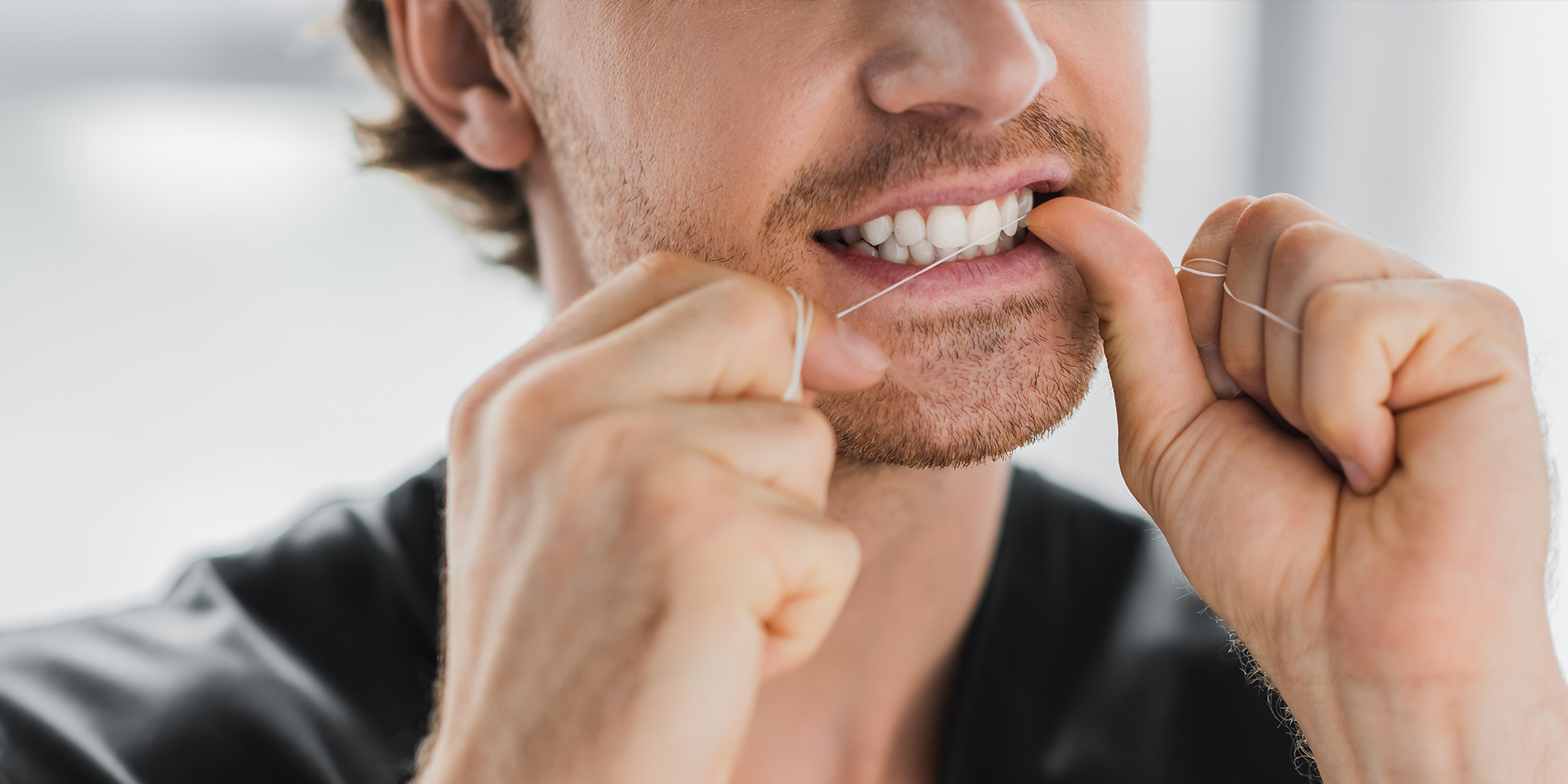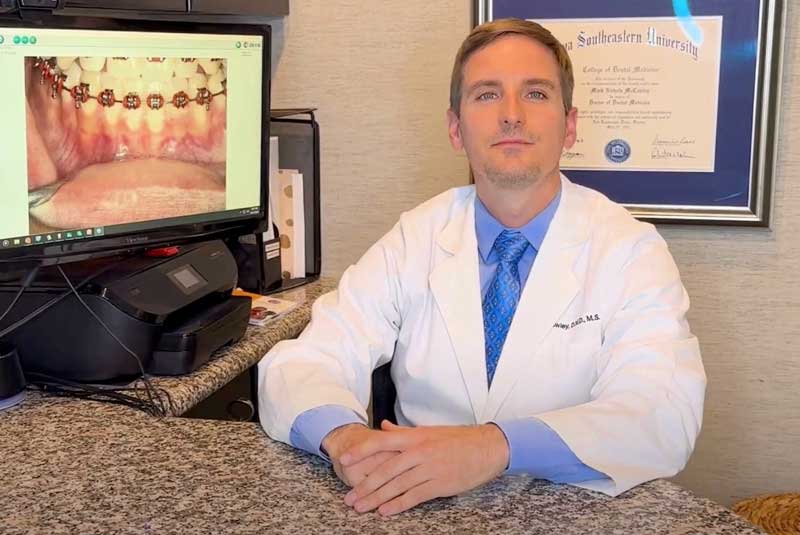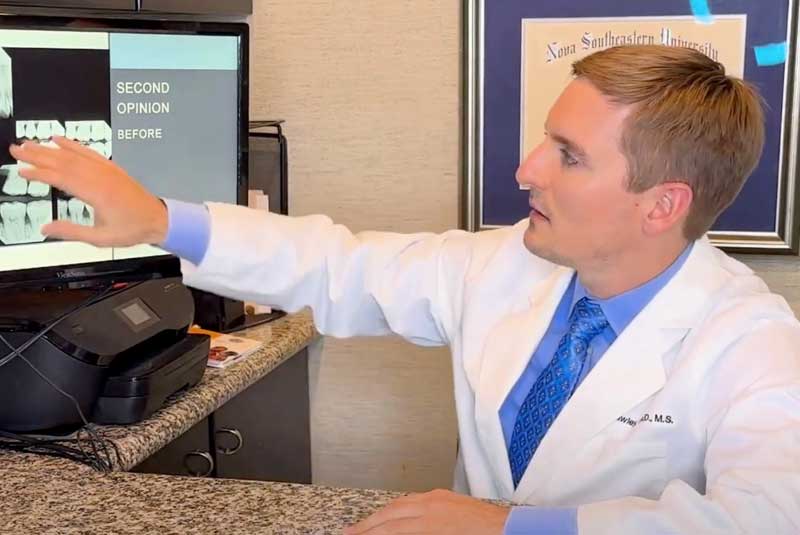| ✅ Reviewed by Dr. Tom McCawley | 🕒 Reading time: four minutes |
If you are considering dental implants, one of the most common questions is: how long do dental implants last?
The truth is that implant success depends on both surgical expertise and the way you care for them afterward. With proper care, the success rate of dental implants is very high, and dental implant longevity can rival that of natural teeth, lasting decades.
How Long Do Dental Implants Last?
Dental implants are designed to be a replacement for missing teeth. The titanium post that integrates with your jaw bone can last for the rest of your life when placed correctly and cared for properly.
The implant restoration that attaches to the implant may need replacement due to natural wear, but the implant itself is meant to be a lasting solution..
Tip 1: Maintain Excellent Oral Hygiene
Daily brushing and flossing are essential to protect your implants. Neglecting oral hygiene allows plaque to harden into tartar, releasing toxins that can trigger gum disease.
Use a soft-bristle toothbrush, non-abrasive toothpaste, and clean around the implant daily to reduce bacteria buildup. Just as important, schedule regular dental check-ups and professional cleanings so your periodontist can monitor your implant health and catch any issues early.
Tip 2: Choose a Nutritious Diet
What you eat has a direct impact on both healing and long-term implant stability. A diet rich in vitamins, minerals, proteins, and calcium supports strong bone health and a resilient immune system. Limiting sugary, sticky, or excessively hard foods helps reduce risk of damaging your implant crown or encouraging bacterial growth.
Tip 3: Avoid Smoking
Smoking is one of the leading risk factors for implant failure. Nicotine restricts blood flow, slows healing, and weakens the body’s ability to fight infection. Studies consistently show lower implant survival rates among smokers. Quitting or reducing smoking greatly improves the chances your implants will last a lifetime.
When Problems Arise
While dental implants are designed to last for decades, they can still face complications. The most common cause of implant failure is peri-implantitis, a bacterial infection that damages the gum tissue and bone surrounding the implant.
When plaque and tartar are not fully controlled, bacteria settle around the implant and trigger inflammation. Over time, this leads to bone loss, loosening the implant’s foundation. Left untreated, the implant may fail.
Saving Implants With LAPIP®
At McCawley Center for Laser Periodontics & Implants, we specialize in treating peri-implantitis with a minimally invasive laser procedure called LAPIP® (Laser Assisted Peri-Implantitis Procedure). This technique uses a thin laser fiber to precisely target infection and stimulate healing.
During LAPIP® treatment:
- A laser fiber is inserted between the gum and implant to remove infected tissue and kill bacteria.
- Ultrasonic instruments clean the implant surface without damaging it.
- A second pass of laser energy helps form a protective blood clot that seals the area from reinfection.
- The laser also stimulates the body’s natural healing response, encouraging new bone growth to rebuild stability around the implant.
Unlike traditional surgery, LAPIP® preserves healthy tissue, encourages regeneration, and directly addresses the bone loss that threatens implant survival. For many patients, this means their implant can be saved rather than replaced, even after significant infection has developed
Schedule Your Consultation in Fort Lauderdale
Dr. Tom McCawley and Dr. Mark McCawley focus on helping patients keep their implants whenever possible. If you have been told your implant cannot be saved, we welcome second opinions and are proud to offer alternatives that protect your smile.
To book an appointment at our periodontal office in Fort Lauderdale, FL, call (954) 807-4829 or visit us at 800 East Broward Blvd #706 Fort Lauderdale, FL.
FAQs
Implants integrate with the jawbone, providing a stable and permanent foundation. Bridges and dentures typically need replacement every 5–10 years, while implants can last decades or longer with proper care.
The biggest risks are poor oral hygiene, untreated gum disease, smoking, and certain medical conditions that affect healing. Trauma or grinding teeth can also damage the implant crown and put stress on the implant.
Often, yes. With LAPIP®, we can remove the infection, regenerate bone, and help preserve the implant instead of removing it.
The titanium post is designed to last a long time. The implant restoration (dental crown, dental bridge or denture) may need replacement due to wear, but it can be replaced without removing the implant itself.











